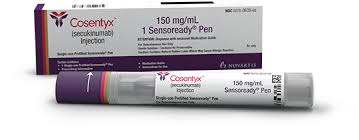As the post-sales survey found new adverse reactions for Novartis' psoriasis treatment, Cosentyx (ingredient: secukinumab), the regulatory agency has set about to update the warning label for the treatment.

Cosentyx, an interleukin (IL) inhibitor, has received approval to treat plaque psoriasis, psoriatic arthritis, and axial spondyloarthritis in Korea.
The Ministry of Food and Drug Safety (MFDS) recently drew up a draft order to change permits based on the results of the reexamination of Cosentyx, Cosentyx Sensoready Pen, and Cosentyx prefilled syringe and sent an official letter to the relevant organizations to hear their opinions, a ministry official said Thursday.
The deadline for submitting comments is until July 1.
According to the ministry, Novartis Korea conducted a post-marketing survey on 977 patients for six years for a domestic reexamination. As a result, the company confirmed an incidence rate of adverse events of 17.8 percent (174 people, 240 cases) regardless of the causal relationship.
Among them, severe adverse drug reactions that could not exclude a causal relationship were 0.41 percent (four patients, four cases). Severe adverse reactions included ileal ulcer, ulcerative colitis, and nephritis.
Unexpected adverse drug reactions that could not exclude a causal relationship were 3.28 percent (32 patients, 41 cases), with patients suffering from skin and subcutaneous tissue disorders such as pruritus, rash, exacerbation of psoriasis, pustular psoriasis, blisters, contact dermatitis, erythema, skin pain, and pruritic rash, and gastrointestinal disorders such as nausea, indigestion, abdominal pain, aphthous stomatitis, ulcerative colitis, Crohn's disease, and irritable bowel syndrome.
Also, some subjects experienced dizziness, muscle pain, wet cough, amenorrhea, and dizziness.
However, the ministry said it does not mean that the PMS survey has proven a causal relationship between drug ingredients and adverse events concerning systemic disorders, such as injection site bruises and administration site conditions.

